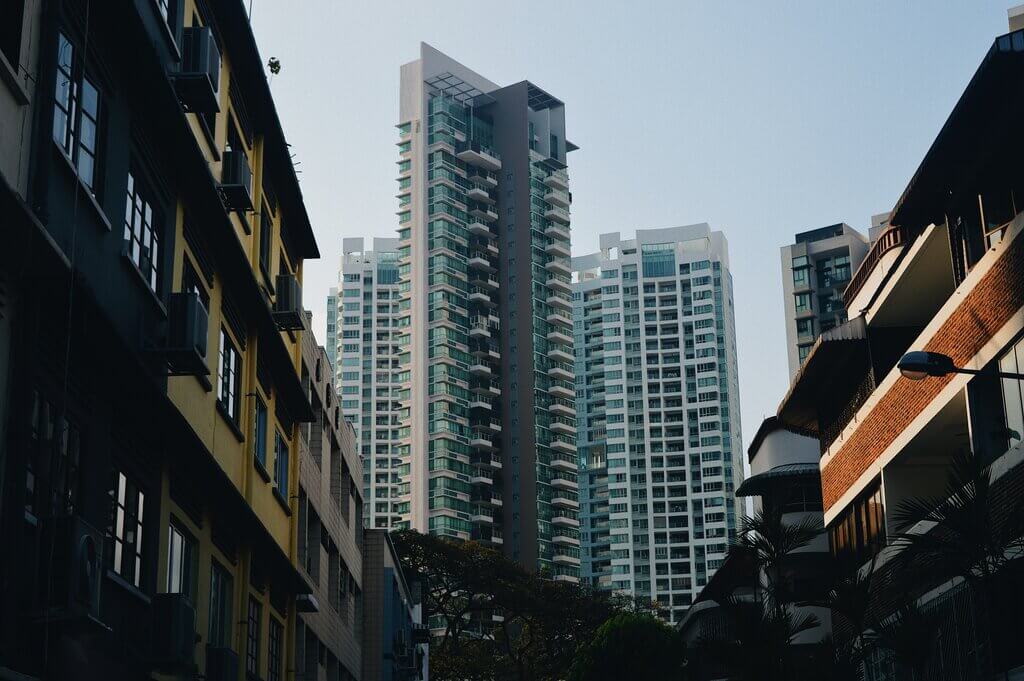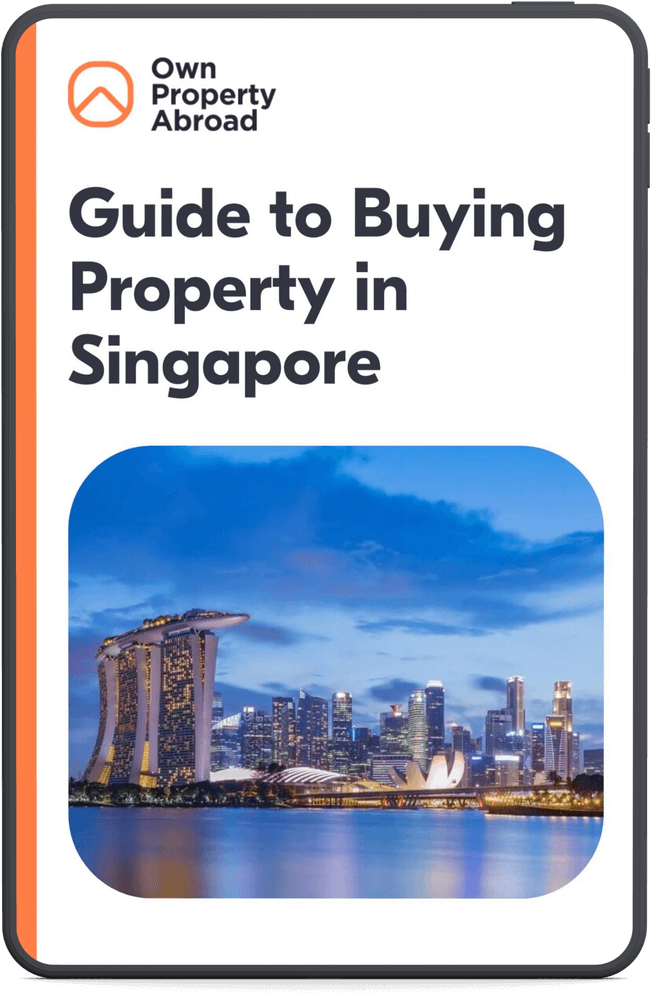Eligibility criteria to sell property in Singapore
In Singapore, the rules for foreigners mainly focus on buying property, not selling it. Luckily, selling a house is usually straightforward if a foreigner has legally purchased a property. However, a few regulations exist for foreigners who want to sell property in Singapore.
But who is considered a foreign person in Singapore?
Under the Residential Property Act, a foreign person is considered not any of the following:
- Singapore citizen
- Singapore company
- Singapore Limited Liability Partnership
- Singapore society
Regulations for foreigners selling real estate in Singapore per property type
The regulations on how to sell real estate in Singapore differ per property type, such as residential property, HBD flats, commercial property, and industrial property.
Residential property (private):
- Selling: There are no specific restrictions once a foreigner legally acquires a private residential property in Singapore. However, the Seller’s Stamp Duty applies if the property is sold within the first three years of purchase.
- Restrictions on purchase: Foreigners need government approval to buy landed properties, but foreigners can buy condominium units without permission.
HBD Flats:
- Buying: Foreigners are generally not allowed to purchase HBD flats, which are public housing units in Singapore. Only Singapore citizens and permanent residents can buy these, with some restrictions.
- Selling: Suppose a foreigner somehow owns an HBD flat (through inheritance of marriage to a Singaporean). In that case, they might face restrictions when they sell a house. It’s best to consult with the Housing & Development Board (HDB) for specific guidelines.
Commercial property:
- Foreigners can buy and sell commercial properties in Singapore, such as office spaces and shops, without restrictions.
Industrial property:
- Foreigners can also buy and sell industrial properties in Singapore. Still, there might be some restrictions or requirements depending on the type of industry and the property’s location.

A step-by-step guide to selling your house in Singapore
Selling a house in Singapore by following the nine steps below:
Step 1: Research the local real estate market
Researching the Singapore real estate market to sell property is crucial for several reasons. Firstly, it provides insight into current market trends, which helps sellers determine the best time to list and sell the house for the best price.
Secondly, sellers can set realistic expectations for their property’s value by understanding the market. Lastly, being informed about the local real estate market empowers sellers during negotiations. Sellers can also decide to engage with a qualified agent to ease the process of selling real estate in Singapore.
Step 2: Hire a certified real estate agent
Choosing a real estate agent in Singapore can be beneficial when selling land or property. Even though individuals aren’t required to sell property through an agent, they can simplify the selling journey. An agent can help gain visibility, offer essential tips and guidance, and quicken and assist in selling.
Step 3: Gather all necessary documentation
Several documents are needed for a smooth transaction when you sell a house in Singapore. The necessary documentation required is Proof of ownership, Sales and Purchase Agreement, Property Tax Statement, outstanding mortgage details, maintenance and service fees (statements showing all maintenance and service fees are needed for properties like condominiums), identity documents, property details, and any special permissions.
Step 4: Prepare your house in Singapore for sale
Preparing your Singapore property for sale is essential to attract more potential buyers, get the best price possible, and sell the property sooner. This includes decluttering, deep cleaning, addressing, and fixing minor repairs. Modifying decor and staging the home could be a part of this process.
Step 5: Set a competitive asking price
Deciding on a range of prices is essential based on the kind of house being sold. For estimating the cost, looking online at different listings and properties can help decide an asking price within the market price. Other factors that should be considered are the property’s condition, location, size, and market trends when selling property in Singapore.
Step 6: Listing and marketing the property
After following the first steps, it’s time to showcase the house on the market and start marketing it. Listing the property across real estate platforms can boost visibility and reach a broader audience. Reaching potential buyers is critical to a successful sale when selling a house. Beyond online listings, consider marketing strategies like open houses, flyers, and social media promotions. Doing so is optional when you have an agent since they will do this for you.
Step 7: Allow viewings of your property
Allowing potential buyers to view the property firsthand offers several advantages. Physical viewings enable buyers to establish an emotional connection with the property. Besides, it shows transparency and trust since buyers can see no hidden issues or misrepresented aspects of the property. Allowing potential buyers to view your property can enhance their overall experience, build confidence, and increase the likelihood of receiving genuine offers.
Step 8: Negotiating with potential buyers
Negotiating the price when you sell a house in Singapore is both an art and a science. Practical negotiation skills can make a significant difference whether you sell a house individually or through an agent. Before negotiating, establish your baseline price – the lowest offer you will accept when you sell your property. Be flexible yet firm. It’s also essential to be well-informed about the property’s current market value, be open to counteroffers, and be patient. When working with an agent, lean on their expertise.
Once a verbal agreement is reached, ensure all terms are documented in writing to avoid misunderstandings later.
Step 9: Completion of sale and legal process
When completing the sale and legal process, a conveyancing lawyer needs to be hired to process different transactions that need to be completed before ownership can be transferred. An Option to Purchase (OTP) is signed between the seller and buyer. The potential buyer typically has about 14 days to act before the deadline. To keep the buyer engaged, consider obtaining an option fee. This is a payment made in return for your OTP. When the buyer has signed the document before the end of the deadline, this step is finalized, and the property is sold. If the buyer doesn’t follow through with the option to purchase, you have the right to retain the option fee.
The lawyer should be settling most of the paperwork from the transaction. The last responsibilities will be to review, sign the necessary documents, and finalize the property sale. As the deal nears completion, the seller must begin organizing and planning the move-out process. Ensure you coordinate with moving services, notify relevant parties of your change of address, and start packing to facilitate a smooth transaction.
Valuable insights and practical advice, distilled from years of expertise and real-world experience.


Which 8 taxes and fees should you consider when selling property in Singapore?
When you sell a house in Singapore, there are several taxes and fees to be aware of. Below is a list of the eight different taxes and fees.
Seller’s Stamp Duty (SSD)
Seller’s Stamp Duty in Singapore is a tax imposed on property sellers if they sell their property within a specific period after purchasing it. When selling within that period, a percentage of the property’s value or setting price must be paid.
| Selling within the first year of purchase | Selling within the second year of purchase | Selling within the thirth year of purchase | |
|---|---|---|---|
| Residential properties | 12% | 8% | 4% |
| Industrial properties | 15% | 10% | 5% |
Legal fees
There is a good chance you’re hiring a lawyer to handle the conveyancing process; fees must be paid. These fees vary based on the complexity of the transaction and the law firm.
Agent’s commission
When engaging a real estate agent to help sell the house, a commission is paid upon the successful sale. The commission rates can vary, but typically, it’s a percentage of the property’s selling price.
Discharge of mortgage
If the property has a mortgage, there could be costs related to settling or clearing that mortgage.
Maintenance fees
For properties like condominiums, you need statements showing that all maintenance and service fees are settled.
Property tax
Ensure that all property taxes are paid up to the date of the sale. The seller should settle outstanding amounts with the Inland Revenue Authority of Singapore (IRAS).
Goods and Services Tax (GST)
For commercial properties, GST might be applicable on the sale. It’s essential to check if you’re required to charge GST.
Other fees
When selling property, you might encounter additional costs. These include administrative fees, photography/marketing fees, staging costs, and property valuation.

Potential challenges and solutions when you sell a house in Singapore
As a foreigner, you may encounter several challenges due to Singapore’s unique regulatory environment and market dynamics. Here are some potential challenges and solutions:
Challenge: Restrictions on property types
- Foreigners face restrictions when buying property in Singapore.
- Solution: Ensure that potential buyers can purchase the property you’re selling. Engaging with a trustworthy real estate agent can be beneficial.
Challenge: Limited buyer pool
- Because of the restrictions for foreigners, the collection of potential buyers can be limited.
- Solution: Target the right audience by marketing the property effectively.
Challenge: Transferring funds overseas
- Sending the sale earnings back to the foreigner’s native country may face specific rules or limitations.
- Solution: Consult with a financial advisor or bank familiar with cross-border transactions to understand the best money transfer methods.
Challenge: Mortgage settlement
- You might face early repayment fees or other charges if the property was bought with a mortgage.
- Solution: Check with the bank or financial institution about the mortgage terms and any associated fees for early settlement.
Challenge: Cultural and communication barriers
- Cultural and communication barriers may arise when you sell a property in a different country. These barriers can be differences in negotiation styles, expectations, or communications.
- Solution: Work with a (local) real estate agent who understands the local market and the needs of foreign sellers better. They can serve as a mediation.
By being aware of these challenges and proactively seeking solutions, foreigners can navigate the process in Singapore more smoothly when they want to sell property.
Sell your property in Singapore with Own Property Abroad
Thinking about selling property in Singapore? Our comprehensive ebook is designed to guide you through the entire process, from understanding local regulations to handling legal requirements, negotiations, and due diligence. With the right knowledge, you can navigate Singapore’s real estate market smoothly and successfully. Want personalized support? Leave your details below, or email us directly at [email protected].
Valuable insights and practical advice, distilled from years of expertise and real-world experience.


Frequently Asked Questions (FAQs)
Can I sell my property in Singapore?
Yes, you can sell your property in Singapore, whether locally or abroad. However, the process and regulations may vary based on your citizenship status and the type of property you own. Awareness of the specific rules, taxes, and fees associated with selling is essential. Engaging a real estate agent or a legal professional can help streamline the process.
Is it easy to sell my condo in Singapore?
The ease of selling a condo in Singapore depends on various factors, including the property’s location, condition, market demand, and economic conditions. Generally, condos in prime locations or near amenities tend to sell faster. However, understanding the current real estate market trends and setting a competitive price can significantly influence the selling process. Engaging a real estate agent can also simplify the process and increase the chances of a successful sale.
Do I need an agent to sell my house in Singapore??
No, you don’t need an agent to sell your house in Singapore. However, doing so requires a thorough understanding of the property market, legal procedures, and documentation. It’s essential to be well-informed about selling, from listing the property to handling negotiations and finalizing the sale. While selling alone can save you agent commission fees, it may also demand significant time and effort.
What are the costs of selling property in Singapore?
The costs of selling property in Singapore include Seller’s Stamp Duty (SSD), agent’s commission upon a successful sale, legal fees for conveyancing, and potential costs related to settling any existing mortgage. Additionally, there might be administrative fees, property valuation costs, and, for specific properties, maintenance fees to ensure all dues are settled before the sale. It’s essential to know these costs to set an appropriate selling price.
What is the process of selling private property in Singapore?
The process of selling private property in Singapore involves several steps. First, research the local real estate market for an appropriate selling price. Next, you can engage a real estate agent to assist with the sale or list the property on various platforms. Once you’ve found a potential buyer, negotiations occur, followed by the Option to Purchase (OTP) signing. The sale concludes with legal conveyancing, where ownership is officially transferred to the buyer.
What tax is for selling property in Singapore?
The taxes for selling property in Singapore include the Seller’s Stamp Duty (SSD) for properties sold within three years of the purchase, legal fees for conveyancing, and agent commissions. Additionally, there may be costs associated with settling mortgages, maintenance fees for condominiums, property taxes, and Goods and Services Tax (GST) for commercial properties.
What is conveyancing?
Conveyancing is the legal procedure of transferring property ownership from one individual to another after you sell a property. Typically, this takes around 12 weeks. Both buyers and sellers should consider hiring a lawyer for this process. The costs for hiring a lawyer in Singapore can differ from SGD 1,300 ($976) to SGD 3,200 ($2,403).
However, for HDB flat buyers, the situation is different as the board acts as the buyer’s legal representative. The HBD defines its costs and fees. A lawyer will help review the terms of the Option to Purchase (OTP).



